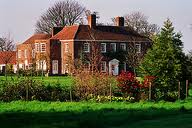We drove down to Easton Glebe to see Jane Wells.
The home of H G Wells during the First World War and the centrepiece of his wartime novel Mr Britling Sees it Through (1916). The house, a former rectory, was rented from the Countess of Warwick at Easton Lodge, Wells's colleague in the Fabian Society and the centre of a theatrical circle
Frank Wells was there with fiancee Peggy, and Gyp with wife Marjorie. Jane was too ill to come down or to see anyone. H.G. was visibly very much upset indeed. The Hugh Byngs came to lunch too. I think H.G. likes a lot of people to distract him. We played a bit of ball game in the barn, but not H.G. nor Marjorie.
Basil Dean and Lady Mercy called in about 3.30.
Basil Herbert Dean CBE (1888 – 1978) was an English actor, writer, film producer/film director and theatrical producer/director. Born in Croydon, Surrey, Dean started his career in showbusiness in London as a West End stage actor, and then later became a theatrical producer. He later moved into the film industry and in the early 1930s founded Associated Talking Pictures, which later became Ealing Studios. He publicised and worked alongside Gracie Fields and George Formby, among other entertainers. When the war started he left the film industry and became the head of ENSA, the government-sponsored body responsible for bringing live performances to the armed services. He was awarded the CBE for his work with ENSA. His wives included Lady Mercy Greville.
I have recently been reading David Lodge's book "A Man of Parts" in which he imagines an ailing H.G. sequestered in his blitz-battered Regent's Park house in 1944, looking back on a life crowded with incident, books and women. Lodge depicts a man as contradictory as he was talented: a socialist who enjoyed his affluence; an acclaimed novelist who turned against the literary novel; a feminist womaniser. The book seems to be to be well constructed, well imagined and largely accurate, and yet it is dull - and H.G. was never dull!
I have recently been writing to H.G. to recommend that he consult Raphael Roche about Jane's cancer. Roche made a favourable impression on me when I talked to him for two hours in July. He does not claim any cure but does suggest that his 'treatment' is, at the least, an effective palliative; what is there to lose?
Raphael Roche 1857 – 1945 was a Jewish homeopath who practiced in London, and who came from a well known musical family. He was the grandson of Ignaz Moscheles, and a famous pianist, conductor and musician in his own right. Roche was a physician at The Liverpool Homeopathic Dispensary, and a Member of the London Branch of the Medical Council and a Physician at the London Homeopathic Hospital. He treated George Bernard Shaw and Edward Hesketh Gibbons Pearson, and apparently cured a great many people of ‘incurable diseases’, including cancer. Raphael Roche was a friend of Arnold Bennett, Herbert George Wells, Almroth Edward Wright. He wrote "The Science of Medicine", and many books on music, as well as "Dithyrambs and Outrages: Voltaire seen by his contemporaries".
I read most of Jack's (sic) "The New Germany" in the afternoon and evening.
Ernst Friedrich Wilhelm Jackh (born 1875 in Urach; died 1959 in New York City ) was a journalist , managing director of the German Werkbund, and university professor at the German University of Politics in Berlin, the New Commonwealth Institute in London and the Columbia University in New York City . Jackh was especially known for his commitment to a liberal parliamentary democracy in Germany after 1918 and for his support of the Young Turk revolution in the German media.
Still going on with Gibbon.




No comments:
Post a Comment